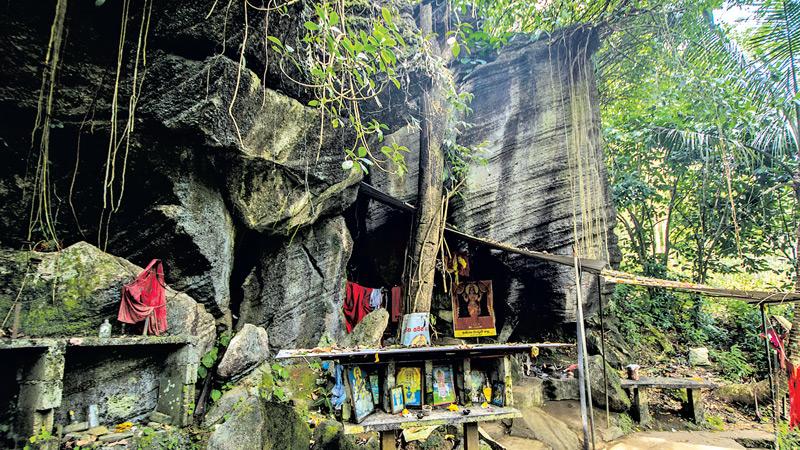
 I the past few years, I have been blessed to repeatedly visit several Hindu Siva and Ganesh temples, all along the upcountry, close to Maskeliya. The Maskeli Oya, a tributary of Kelani Ganga, as it wends its way from Maskeliya and beyond, becomes narrow and creates a beautiful waterfall known as Laxapana near Koththalena. Along the river bank and the foothills of the Seven Virgin Hills is this rock shrine – Purana Pattini Devale.
I the past few years, I have been blessed to repeatedly visit several Hindu Siva and Ganesh temples, all along the upcountry, close to Maskeliya. The Maskeli Oya, a tributary of Kelani Ganga, as it wends its way from Maskeliya and beyond, becomes narrow and creates a beautiful waterfall known as Laxapana near Koththalena. Along the river bank and the foothills of the Seven Virgin Hills is this rock shrine – Purana Pattini Devale.
This lesser known shrine drew me to this once grand old route to Sri Pada, now a forgotten route for Sri Pada climbers. For someone who chases monuments of faith and forgotten ruins across the country, everything that Koththalena had to offer fascinated me.

When my friend told me about this cave shrine on the bank of the Maskeli Oya, I was more than happy to cross the bridge and we went in search of it.
Amidst massive Albizzia trees and a green carpet of tea plantations, I found the most exquisite cave shrine.
It was a small but mysterious cave shrine with a small Buddha statue and a few statues of Hindu gods and goddesses, and as the sun’s rays fell on it, its dark moss laden rock surface glowed, the shade from the trees giving it a dappled effect.
The rock shrine is covered with foliage and there are no human settlements nearby. Dimly lit, it looks a mysterious place.
The sanctum stands on a higher elevation and is looked after by the villagers, who include a few Buddhist families and Hindus who are mostly estate workers in the nearby tea plantation of Koththalena.
The rock shrine is about 10 metres in height. There is no door and the shrine is kept open due to its vast rocky mouth. Not much is known of the builder of this old shrine.
Legend has it that people of Uttara Pradesh, the hottest province in India, suffered epidemic diseases such as measles, yellow fever and chicken pox, considered as diseases associated with the deities. Those afflicted with the diseases made vows to Goddess Pattini. The plantation workers who had settled down in this region were mostly immigrants from South India and when they suffered from diseases they made vows to this shrine which is attributed to Goddess Pattini. The rock walls in the shrine have paintings of gods and goddesses and at the centre of the cave stands an altar which contains a statue of Buddha flanked by statues of Hindu gods and goddesses.
The devotees offered pujas on this altar. Prominence is given to deity Sumana Saman who adorns the inner walls of the cave as the principal deity and guardian of the holy mountain Sri Pada (Adam’s Peak), located a few kilometres from this shrine. An exquisite small cave on the right side of the main cave depicts God Siva in his arrogant form.
He is flanked by goddess Parvati, his companion, and their two sons: Ganesh, the god with the head of an elephant and Skanda or Kataragama Deviyo, whose mission is to fight evil spirits. The detail is fantastic. Most of the statues here are influenced by Hinduism.
“The rock of this cave keeps growing little by little, which is one of the most striking features of this sacred site. We have been monitoring it for more than five years. Now, it has grown a little over two feet,” A.K. Ariyapala, a resident of Koththalena said.
He said there is mysterious healing power in this shrine. “Most people come here to worship and knot a coin in the cave shrine to voice their grievance or make vows and offerings to get blessings from the deities,” he said.
Walking inside and outside the shrine we saw a number of coins tied in the red coloured pieces of cloths and knotted, by devotees in search of divine blessings. Since there is no priest to this shrine, devotees themselves have to prepare pujas and get blessings.
This ancient shrine with its mythology, artistic perfection and message of communal harmony is something that symbolizes the very fabric of this country. I hope it is preserved before it is fully lost to us. The harvest festival of Hindus, Thai Pongol in the month of January, observed in honour of the Hindu sun deity, is around the corner. There will be obligatory worship at this shrine by the Hindu estate workers who celebrate the festival.
